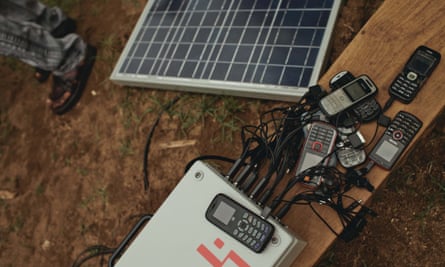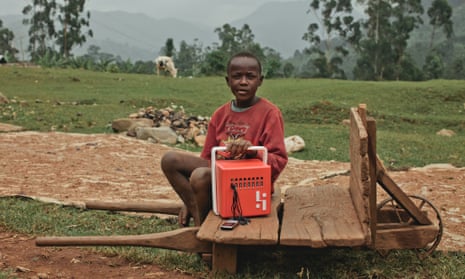When people’s lives are thrown into chaos by war, famine or natural disaster, using renewable energy may not seem like an obvious response. However, a group of UK entrepreneurs believes that decentralised renewable energy could provide a cheap and immediate source of power to those who need it most.
John Hingley, founder of Renovagen, a small company that has developed a lightweight roller solar panel designed to be deployed in war zones and remote locations, came up with the idea while travelling in Asia. He explains:
We were staying in a shack in the middle of the jungle and there was a diesel generator running all night to power the fan and all the lighting. I just knew there were better ways to produce power, but some of these places are hard to get to and pose real difficulties in how you run and maintain the power supplies.
When Hingley returned home, he began experimenting in his garage with tensile fabrics to create a bendable solar panel sheet, investing £40,000 of his own money, along with a £60,000 grant from the Technology Strategy Board (now known as Innovate UK). The result is a patented solar system called RollArray – a 9mm thick photovoltaic sheet that “rolls up like a carpet... [and] can be pulled in a trailer by a Honda Civic”, he says.
Hingley says the system is 10 times more powerful than any other transportable solar generator of the same size, and that a 20ft container can house a system capable of producing 100 kilowatts at peak performance.
The business has UK patents in place and has also filed US and Patent Corporation Treaty patents. With global protection pending, Hingley has begun talks with major buyers.
“There are real market opportunities for these off-the-grid locations and also for areas hit by natural disasters across the world,” he says. “You need to get power on the ground very quickly after a disaster to power things like medical facilities, communications and water desalination machines – things that are going to save people’s lives.”
Hingley is also engaged in talks with the US military. “The military is very interested as they can power forward operating bases with this and reduce fuel convoys. During the Iraq and Afghanistan wars, 3,000 US soldiers were killed in fuel convoys, so there are a huge amount of lives that could be saved.”
Wars often lead to civilians being displaced to safer areas, such as refugee camps. Living in these communities can be highly stressful, particularly as family members can become separated and lost in camps which have populations larger than many cities.
Daniel Becerra, co-founder of BuffaloGrid, aims to relieve some of these worries by enabling mobile phones to be charged in off-grid locations. The UK company has developed a small portable unit resembling a toolbox which users can plug their phones into to charge. The BuffaloGrid Hub can run off any power source, including solar panels. Users unlock the box via text message to enable it to charge and in return the company obtains data valuable to major telecoms providers.

Becerra says there’s a huge demand for this because many of the world’s poorest people, while lacking a power supply, nevertheless have their own mobile phones. He says the UN is interested in his company’s services to aid disaster relief in key areas. “Our unit is something which can definitely be very useful in the situations where they are working,” he explains.
But off-grid power is not only needed in times of war and natural disasters. The most poverty-stricken regions of the world lack access to continuous power. Varun Sharma, director of corporate development at Bboxx, which sells off-grid solar systems, says this market gap is driving the growth of the business. Bbox’s core product is a solar home system, known as the BB17, which contains a 17 amp battery encased in a control unit. This allows people in cut-off regions to power a range of standard appliances.
Bboxx – which works in 35 countries, including Kenya, Rwanda and Uganda – is effectively trying to create a utility company for the developing world. Like Hingley and Becerra, Sharma regards decentralised renewable power as the only way to bring electricity to the world’s poorest and most vulnerable regions.
“We want to replace the need to extend the grid to those areas,” Sharma says. “The areas we are in don’t have the purchasing power to get a grid connection and keep it running. The likelihood of the extension of the grid ever taking place, in terms of the economics, is low.”
The technology and innovation hub is funded by BT. All content is editorially independent except for pieces labelled “brought to you by”. Find out more here.
Join the community of sustainability professionals and experts. Become a GSB member to get more stories like this direct to your inbox.

Comments (…)
Sign in or create your Guardian account to join the discussion